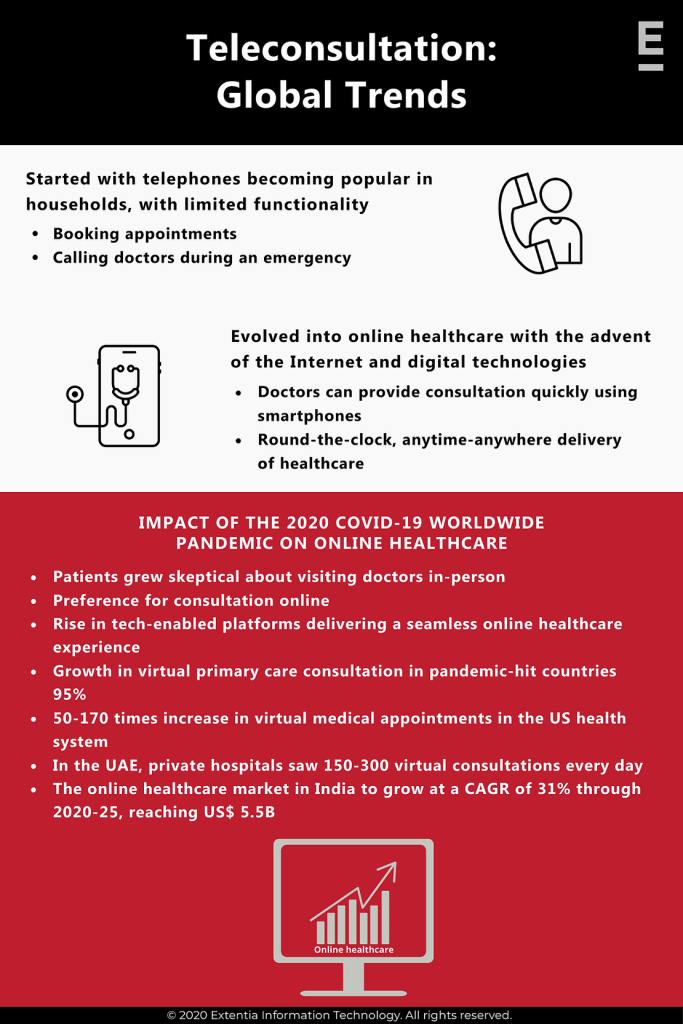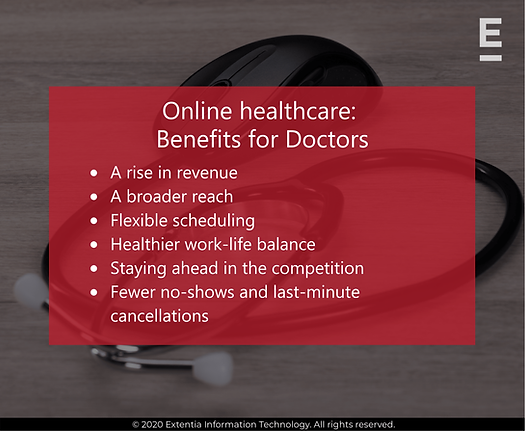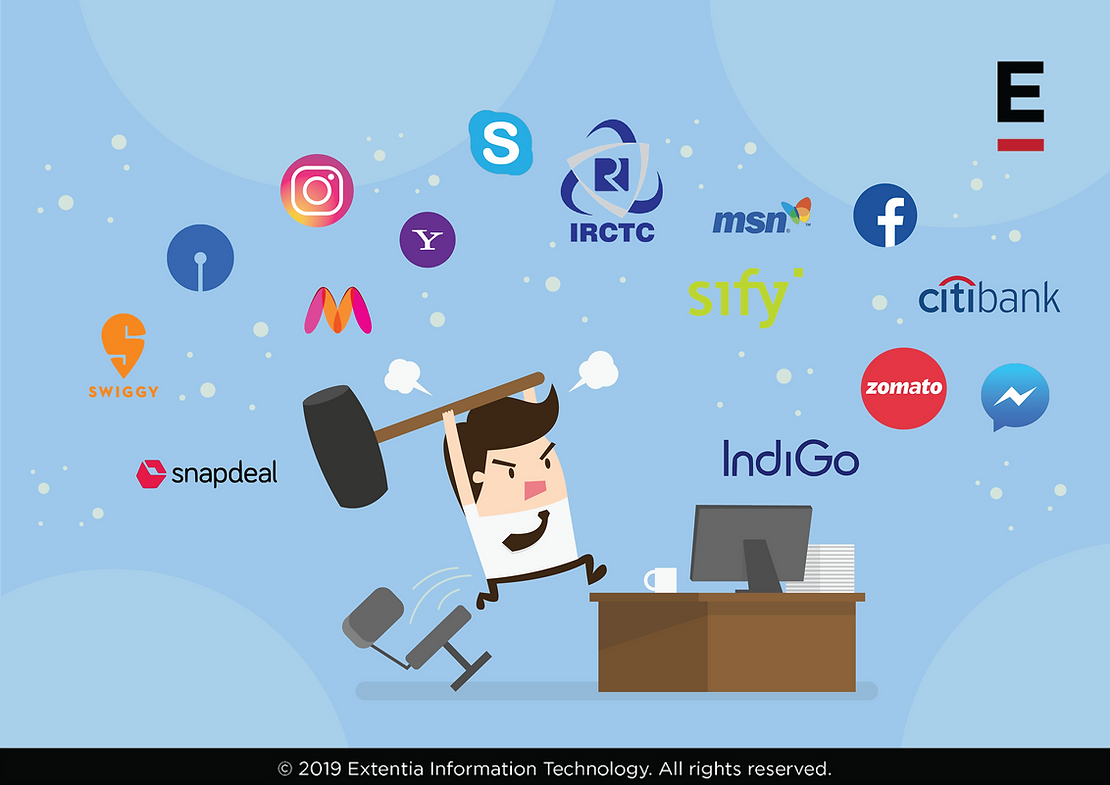As buying trends shift toward online shopping, people worldwide are seeking healthcare online. According to a survey conducted by Doctors.com on more than 1700 adults in the US, 80% percent of people in the survey searched online for healthcare-related information and services. Many technology businesses could envision this shifting trend and have started investing in online healthcare; however, COVID-19 gave it an actual push. Even doctors and service providers began leveraging digital technologies to make healthcare more accessible and serviceable to their patients.
In the previous post, the first in our special series on online healthcare, we looked at online healthcare from the patients’ perspective. Let us see how doctors have taken to online healthcare and the benefits they can expect. Read on for more!
Global trends for teleconsultation
Teleconsultation has been around since telephones became a popular household appliance, but, with limited functionality. Back then, it was primarily used for booking appointments and calling doctors during an emergency. With the advent of the Internet and digital technologies, teleconsultation has evolved into online healthcare – a more pervasive and ubiquitous form of healthcare. The affordability and widespread technology adoption have unshackled the healthcare industry, making online healthcare more accessible to people globally. Today, doctors can provide consultation to patients rather quickly using just smartphones and a reliable internet connection. Such a setting makes round-the-clock, anytime-anywhere delivery of healthcare extremely easy and accessible.
With countries opting for a nation-wide lockdown to curb the spread of COVID-19, patients have increasingly been skeptical about visiting doctors in-person for acute ailments. A significant number of them, instead, now prefer availing consultation online. Patients with chronic and high-risk diseases were the first to shift to the online consultation, considering the high-risk involved in missing doctor appointments, given the seriousness of their illness.
Since March 2020 in particular, numerous tech-enabled platforms have emerged across markets to deliver a seamless experience for patients and doctors. Countries severely affected by the pandemic have witnessed growth in virtual primary care consultations by as high as 95%. The US health system alone has seen a 50-170 times increase in virtual medical appointments. Likewise, the UAE approved a staggering six teleconsultation platforms in April; private hospitals reported 150-300 virtual consultations every day. Similarly, the online healthcare market in India – a leading emerging economy – too is poised to grow at a CAGR of 31% through 2020-25 and reach US$ 5.5B.

Benefits for doctors – reasons for doctors to adopt online healthcare
Online healthcare proved to be as much advantageous for the doctors as it has for patients. Here’s how:

A rise in revenue: Video consultations are more efficient than in-person ones. It enables doctors to schedule multiple appointments in the same amount of time. It’s a positive proposition, all in all – higher revenue potential coupled with reduced fixed costs due to reduced office staff and space requirement. Many doctors prefer this arrangement for the reasons stated above.
A broader reach: The ability to hold a doctor-patient dialogue from anywhere via video calls delivers a direct business benefit to doctors. It allows them to reach patients across new and distant geographies, which wasn’t possible with the traditional in-person model.
Flexible scheduling: Appointments can be scheduled over smartphones or tablets using the Internet. Thus, enabling doctors to schedule calls flexibly, over extended hours, or even on weekends.
Healthier work-life balance: Doctors can hold online video appointments from home and outside of regular work hours, resulting in a freedom to choose and a healthier work-life balance. Traditionally, doctors have been reluctant to take a vacation, but, given the flexibility that online healthcare offers, they can now provide critical care to patients even while traveling.
Staying ahead in the competition: Doctors many times face the risk of losing patients to the competition. Retail walk-in clinics and standalone urgent care setups are convenient alternatives for time and cost-conscious patients. But with online-consulting, patients can reach out to doctors without worrying about distance, time, or cost. This can help in improving the doctor-patient relationship and long-term association.
Fewer no-shows and last-minute cancellations: Patients booking in-person appointments, often fail to show up due to various reasons like commuting difficulty, the need to attend to a family member or be at work. These no-shows and last-minute cancellations waste time and drain revenue. An online setup reduces the chances of these problems enabling patients to schedule their appointment at their convenience and consult doctors from where they are.
The flip side – What doctors don’t appreciate about online healthcare
Uberization: Doctors don’t want to be treated like an uber driver – ‘waiting to be picked up by a patient when required’. The proliferation of online healthcare and teleconsultation aggregation platforms poses the risk of a diminished sense of urgency when it comes to consulting a doctor by patients.
The onus for maintaining data privacy: Doctors are wary of teleconsultation platforms putting the onus on them for maintaining data privacy and confidentiality. This additional responsibility falls outside of their core work, one of the main reasons why some doctors avoid such platforms.
Limitations for specific specializations: Specialist profiles like surgeons, orthopaedists, and dentists face challenges in delivering patient care as healthcare services of this nature require medical equipment, making the in-person model a better fit.
Online healthcare – An evolving promise for doctors
The spotlight on online healthcare will undoubtedly not fade away anytime soon. Even as the world recovers from the COVID-19 crisis and physical movement returns to normal, the advantages of online healthcare will push doctors and patients alike to adapt it further. Doctors are increasingly convinced of the benefits that online healthcare provides for them and their patients.
In the next post from this series, we will look at online healthcare from the perspective of businesses in the healthcare and related domains.




